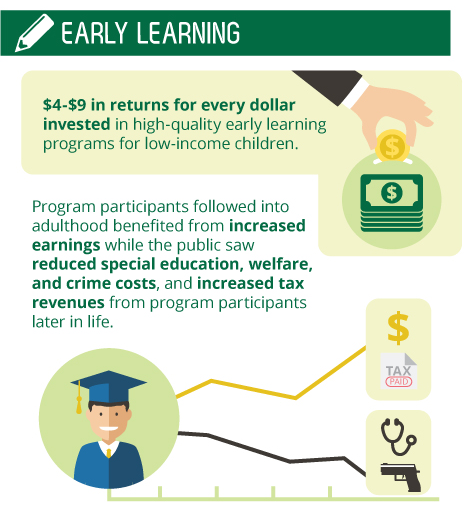Early Learning is a Better Investment than the Stock Market
Experts equate a $4-$9 return for every dollar spent on high-quality early learning programs for low-income children.
But that’s just the beginning.
Nobel laureate James Heckman writes more about the benefits of investing in pre-K in his research paper The Lifecycle Benefits of an Influential Early Childhood Program. NPR talked to Heckman for more context here: How Investing in Preschool Beat the Stock Market, Hands Down.
Here is our CliffsNotes summary of the three major takeaways and three ways you can take action.
3 TAKEAWAYS
- Wraparound supports and personalized attention pay off. The return on investment mentioned above is derived from the monetized, social benefits of wraparound supports and personalized attention, which include the promotion of health, crime reduction, greater earnings, more education, and a higher IQ.
- High-quality pre-K is linked to fuller, richer lives for kids—and their parents. High-quality childcare helps working parents enhance their own lives by allowing them time to get more education and more work experience. For many single, working-class parents that means an increase in social mobility, and an overall more enriched family environment for kids.
- High quality pre-K can increase parental engagement, which is an important factor in the development of a child’s social and emotional learning. A program that engages the child and then shares the child’s success with the parent has been shown to garner more parental engagement than a program that does not. For example, practitioners from one pre-K program read to the child, engaged the child, and then showed the parent the child’s progress. While reading to the child helped increase the amount of words she learned, she also benefitted from having a parent involved in her learning.
3 OPPORTUNITIES TO TAKE ACTION
- Join a Readiness Team in your community. Delaware Readiness Teams are a way for families, early childhood programs, educators, and community and business leaders to expand support systems for kids from birth to third grade using information based on community assessments and action plans.
- Build young families’ awareness of supports such as Parents as Teachers, Delaware Thrives QT30, Healthy Families America, and Nurse Family Partnership.
- Advocate for high-quality early learning, including increasing Stars standards and expanding state-funded pre-K.
Check out the Rodel website to learn more about Delaware education policy issues from Early Learning to college and career readiness.